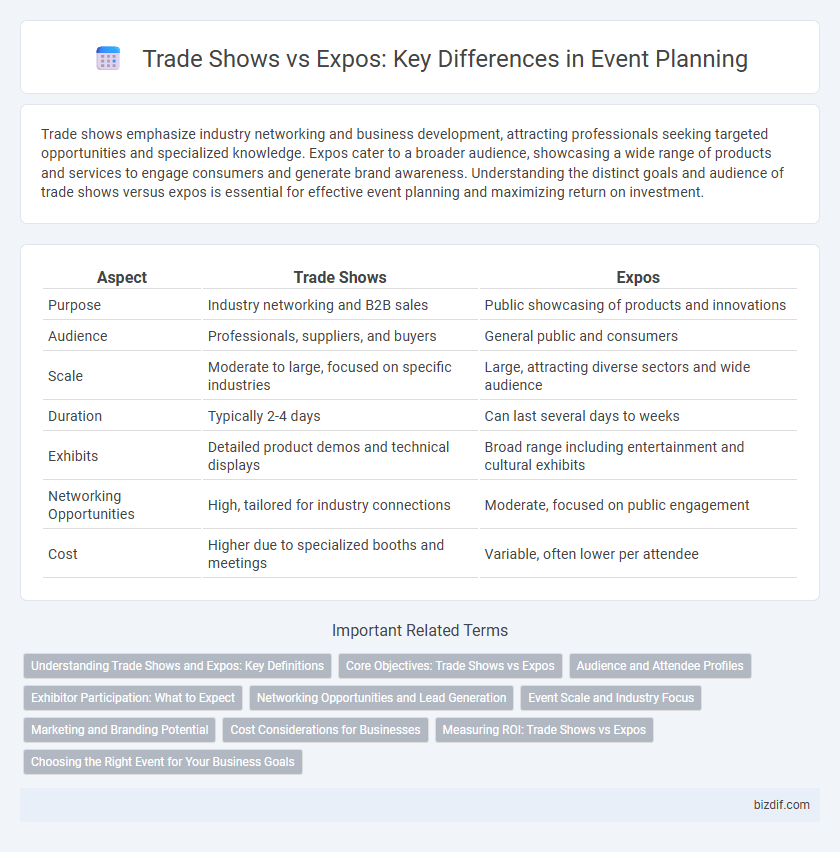Trade shows emphasize industry networking and business development, attracting professionals seeking targeted opportunities and specialized knowledge. Expos cater to a broader audience, showcasing a wide range of products and services to engage consumers and generate brand awareness. Understanding the distinct goals and audience of trade shows versus expos is essential for effective event planning and maximizing return on investment.
Table of Comparison
| Aspect | Trade Shows | Expos |
|---|---|---|
| Purpose | Industry networking and B2B sales | Public showcasing of products and innovations |
| Audience | Professionals, suppliers, and buyers | General public and consumers |
| Scale | Moderate to large, focused on specific industries | Large, attracting diverse sectors and wide audience |
| Duration | Typically 2-4 days | Can last several days to weeks |
| Exhibits | Detailed product demos and technical displays | Broad range including entertainment and cultural exhibits |
| Networking Opportunities | High, tailored for industry connections | Moderate, focused on public engagement |
| Cost | Higher due to specialized booths and meetings | Variable, often lower per attendee |
Understanding Trade Shows and Expos: Key Definitions
Trade shows are industry-specific events where businesses showcase products and network with potential clients, focusing on B2B interactions. Expos, or exhibitions, typically present a broader range of products and services to the general public, emphasizing brand awareness and consumer engagement. Understanding these key definitions helps event planners tailor marketing strategies and logistical plans to maximize event impact.
Core Objectives: Trade Shows vs Expos
Trade shows primarily aim to facilitate B2B networking, product demonstrations, and lead generation, targeting industry professionals and decision-makers. Expos focus on broader public engagement, brand awareness, and showcasing innovations to a wider consumer audience. Understanding these core objectives helps businesses tailor their event strategies to maximize ROI and audience impact.
Audience and Attendee Profiles
Trade shows primarily attract industry professionals, buyers, and decision-makers seeking networking and business opportunities within specific sectors, while expos draw a broader spectrum of attendees including the general public, enthusiasts, and potential customers interested in product showcases and brand experiences. Trade show audiences tend to be niche and focused on B2B interactions, whereas expo attendees exhibit diverse demographics with varied interests in entertainment, education, and shopping. Understanding these distinct attendee profiles enables event planners to tailor marketing strategies, exhibitor selections, and engagement tactics effectively.
Exhibitor Participation: What to Expect
Trade shows typically feature industry-specific exhibitors seeking direct business opportunities and networking with targeted buyers, resulting in highly focused participation. Expos attract a broader range of exhibitors from various sectors, emphasizing brand awareness and consumer engagement rather than immediate sales. Exhibitors at trade shows can expect specialized audience interaction and lead generation, while those at expos experience diverse visitor demographics and enhanced promotional visibility.
Networking Opportunities and Lead Generation
Trade shows offer targeted networking opportunities by bringing together industry-specific professionals, enabling focused lead generation through direct interactions and product demonstrations. Expos attract a broader audience, creating diverse networking possibilities that can lead to cross-industry collaborations and varied lead sources. Businesses prioritize trade shows for high-quality B2B leads, while expos are valued for expansive brand exposure and varied customer engagement.
Event Scale and Industry Focus
Trade shows typically target specific industries with a narrower focus and tend to attract a moderate to large-scale audience of professionals and buyers. Expos often encompass a broader range of industries or sectors, drawing larger crowds that include both industry insiders and the general public. The scale of expos is generally larger, featuring diverse exhibits that cater to wide-reaching market interests compared to the specialized nature of trade shows.
Marketing and Branding Potential
Trade shows offer targeted marketing opportunities by connecting brands directly with industry professionals, fostering B2B relationships and lead generation. Expos provide broader audience reach, showcasing products and services to diverse consumer groups, enhancing brand visibility and public engagement. Both platforms boost brand awareness, but trade shows emphasize niche connectivity while expos maximize mass market exposure.
Cost Considerations for Businesses
Trade shows typically involve higher costs due to booth rental, travel, and promotional materials, making them a significant investment for businesses seeking targeted industry exposure. Expos often offer more flexible pricing options and larger audiences, providing cost-effective opportunities for brand visibility and customer engagement. Analyzing budget allocation and return on investment is crucial for companies deciding between trade shows and expos to maximize marketing impact while controlling expenses.
Measuring ROI: Trade Shows vs Expos
Measuring ROI for trade shows versus expos involves analyzing metrics like lead generation, sales conversion rates, and attendee engagement. Trade shows often provide higher ROI through targeted audience interactions and stronger networking opportunities, while expos may offer broader brand exposure but with less direct sales impact. Tracking follow-up activities and integration with CRM systems enhances accuracy in comparing the financial benefits of both event types.
Choosing the Right Event for Your Business Goals
Trade shows offer targeted networking opportunities with industry professionals, ideal for B2B businesses seeking direct lead generation and product demonstrations. Expos provide broader audience engagement and brand exposure, making them suitable for consumer-focused companies aiming to increase market awareness. Aligning event type with your business goals ensures optimal ROI and strategic growth.
Trade shows vs Expos Infographic

 bizdif.com
bizdif.com